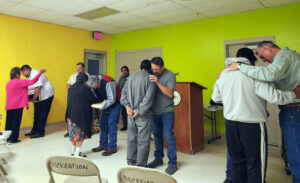
NASHVILLE, Tenn. (BP)–Venezuela President Hugo Chavez forced the country’s oldest television station off the air May 27, further tightening his grip over the nation’s media. The dictator defended his action as “a sovereign, legitimate decision” and said some broadcast stations and newspapers are conspiring to create popular unrest and incite violence. Thousands of Venezuelans took to the streets in opposition and support of the action against RCTV.
The last thing viewers saw of Radio Caracas Television was misty-eyed station employees singing the national anthem, according to the AFP news service. The channel’s successor, government-friendly TVes, was on the air 20 minutes later with a documentary on Antarctica, children’s and exercise programs and government ads saying “Venezuela now belongs to everyone.”
Chavez is driven by “a megalomaniacal desire to establish a totalitarian dictatorship,” RCTV President Marcel Granier said, adding that, “Democracy will return to Venezuela, along with RCTV.” Chavez accused the station of violating broadcast laws, helping incite a failed coup in 2002, and “poisoning” Venezuelans with pro-capitalist programming.
VIOLENCE THREATENS MINISTRIES, OPENS HEARTS — As the Lebanese army shelled militants hiding in a Palestinian refugee camp and Israel retaliated against extremists in the Gaza Strip, one Christian ministry warns the intensified violence in the Middle East could push the region into a broader war.
Members of Fatah al-Islam -– a group accused of links to Al Qaeda and Syrian intelligence -– battled Lebanese soldiers at the Nahr al-Bared refugee camp; Israel’s air strikes , meanwhile, targeted militant Islamic Jihadist groups and were met by Palestinian rocket attacks in response.
The whole region is a tinderbox, E3 Partners’ Tom Doyle told Mission Network News. “Traditionally, when Israel plays a weaker role, a more passive role, things seem to erupt in the region. Most people were saying with Lebanon, it was just a matter of time.” He said instability prevents the group from working directly in the region, but the group’s EvangeCube is being used in the churches as an evangelistic tool.
The economic impact of that instability has kept many people from earning a living, including pastors and church members, Doyle said. At the same time, Christian workers say they have “never seen so many Muslims and even Jews responding to the Gospel like they are right now.”
PIRACY IMPEDES FLOW OF SOMALIA FOOD AID — Pirates are intercepting food shipments off the coast of Somalia, worsening the plight of nearly 35,000 people displaced by the country’s worst violence in 16 years, according to a humanitarian organization operating in the country. Increasing numbers of people in relief centers suffer from respiratory tract infections and acute diarrhea, but medical and food supplies are dwindling.
“Without rapid intervention, malnutrition is also expected to increase,” Sharif Haji, World Vision’s primary healthcare coordinator in Somalia, told Mission Network News.
Pirates have confiscated four shipments of food supplies and the next ship scheduled to travel to Somalia has refused to go without an armed escort, said Josette Sheeran, the World Food Program’s executive director. Food shipments were delayed for weeks after pirates hijacked two WFP ships last year.
MYANMAR ANNOUNCES NUCLEAR PLANS — The military junta ruling Myanmar (Burma) has announced plans to buy a nuclear reactor from Russia, under the terms of a new agreement signed in May. The contract, which the government said would help the country’s badly underdeveloped economy with medical and agricultural research, raises concerns about a secretive weapons program like the ones that have caused problems with Iran and North Korea.
International pressure has been building against Myanmar, which intensified suppression of political opposition after the National League for Democracy won a landslide victory in multiparty elections in 1990. The United States has referred to the country as an “outpost of tyranny” and maintains trade and investment sanctions against the military regime.
Political analysts wonder whether Myanmar might follow the example of Iran and North Korea and use threats of a nuclear weapons program to resist international pressure for political change, according to the Asia Times. Diplomats have said the country’s notoriously uncooperative regime might prove unwilling to cooperate with international nuclear inspectors.
POLICE ALLOW ATTACK ON CHRISTIANS — Homes and stores belonging to Christians were looted and burned and a partially built church was destroyed May 11 by a mob that emerged from Friday prayers at a mosque in Bimha, Egypt. Despite previous warning about the possible rampage, security forces only acted after the riot ended, establishing a perimeter around the village that prevented journalists from seeing the damage.
Ten villagers were hospitalized, two in critical condition, according to “Free Copts,” an organization that monitors persecution of Egypt’s indigenous Coptic Christian community. After the violence, authorities imposed a curfew on Christian residents.
Pamphlets distributed before the violence called on Muslim residents to “rise for jihad” after prayers, stirring a mob, “armed with everything from machetes to containers of kerosene,” to attack Christian properties, according to Egypt’s Al Ahram news service. Police questioned 35 alleged perpetrators and then arrested a Christian man on charges of throwing a bag of flammable liquid into a Muslim prayer area the previous weekend.
“As with other Muslim pogroms over the past decade, the pogrom in Bimha was premeditated, organized, very violent and perpetrated not by members of militant organizations but by local ‘ordinary’ Muslims who had been incited in local mosques during Friday ‘prayers’ to wage jihad and terror against their Christian neighbors in order to ensure their subjugation,” said Elizabeth Kendal of the World Evangelical Alliance’s Religious Liberty Commission. “The tragedy in Bimha takes Egypt another step backward into religious apartheid [and] presents Egyptians with yet another precedent which demonstrates that Copts can be terrorized, robbed and killed with impunity.”
Photographs from Bimha can be viewed at http://www.flickr.com/photos/norayounis/sets/72157600211845855.
–30–
















